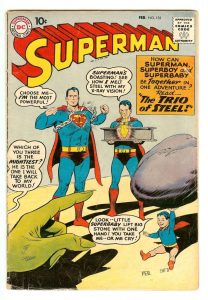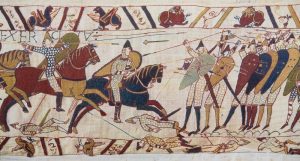When my big brother was a boy, he was besotted with comic books. This was just one of the many passions I didn’t share with him. Comic books seemed like such guy-things to me – cartoony images of violence and macho bravado, accompanied by simplistic narratives inside word balloons, such as “POW!” “WHAM!” and “BANG!”
Come to think of it, I don’t remember ever seeing my brother reading a “real” book when we were kids. Comic books were his thing: action-packed, quick-and-easy-to-read, endlessly exciting and transporting.
He can keep his comic books, I thought snootily then, along with his smooth-leather catcher’s mitt, balsa wood model airplanes, and stacks of silly baseball cards. I’ll stick with my beloved books.
My brother was never without a comic book, rolled up and partially tucked into the back pocket of his dungarees, ready in an instant to unroll and read — to kill a little time, maybe — or to thwack his little sisters with. We girls steered clear, which was just what he wanted.
My brother was born in the late-1930s, during what is known as the Golden Age of comic books, when superheroes such as Superman made their debut. This, I feel, made my brother a bona fide member of what I’ll call America’s original comic book generation.

But, I’ve learned, telling dramatic stories through the medium of sequential art, comic-book style, was nothing new. “Using images to communicate goes back to the 32nd century BC when Egyptians devised hieroglyphs with over a thousand images representing ideas,” the commanding voiceover for the video “The History of Comic Books” announces (https://www.youtube.com/watch?v=qipZ6h4S–c ).
Likewise, in medieval Europe, colorful and sometimes racy stories were depicted through lush scenes woven into tapestries for a largely illiterate public to “read.”

Giovanna Centeno, writing for BookRiot, takes the history of comic books back even further. “Illustrating a story to make it more appealing to an audience has been at the forefront of the human mind since its early existence in caves,” she says. (For her whole, fascinating article, “A Very Brief History of Comic Books,” go to: https://bookriot.com/a-very-brief-history-of-comic-books/ ).
What troubles me, I suppose, is that we’re no longer living in caves or needing to “read” things resembling hieroglyphics on pyramids or woven images on tapestries due to illiteracy. Presumably, we’ve all learned how to read written words in school. Why the current resistance to longer-form reading?
I bring all of this up now because of Facebook. Lately, Facebook has reminded me of comic books and the hold they’ve had on so many people, beginning with my brother’s generation. The Facebook posts that get “read” (and “liked”) today, it seems to me, require the least reading. Facebook “readers” prefer pictures with pithy little labels, which might as well be wrapped in word balloons. Facebook readers want to be entertained, in quick bursts – “WHAM!” – and then move on to the next colorful image. Perhaps other social media outlets are similar, but I don’t follow them.
Don’t get me wrong. I loved my brother. Adored him, really, despite our vastly different childhood interests. And I actually love aspects of Facebook, too, especially its capacity to keep me connected with so many friends, old and new, far and near. We don’t need to say much to each other; it’s enough to know they’re still there.
But I’ve been reminded recently that that skinny little snooty girl with the thick glasses and blond bangs and braids who sniffed at her big brother’s passion for comic books – the girl who loved her books so much she put them under her pillow at night, hoping that by some magic their contents would seep into her brain — still exists. What has happened to real READING?! she still wants to know. What about REAL books? She now wonders: Is this just another comic book generation? Are real-book readers a dying breed? Is the human race slipping into illiteracy? How I hope not.

Bonnie I so agree with you and hope real books will survive!
Kindles are convenient for travel, but I would trade a pair of shoes in my suitcase for a real book! The act of reading words is also a true engagement with another thinker.
Judy Hadlock
Yes, I hope so too, Judy! I love your words “true engagement.” This engagement makes all the difference, doesn’t it.
Always entertaining! Hugs
Kate
Thanks, dear Kate! Hugs back to you, BB
THANK YOU!! I think Facebook is dangerous because it is out of control. Too many young people have been bullied and otherwise damaged by it. There is too much teen depression at the present time. Blessings. I enjoy your posts,
Dear Mireille — So happy to know you’re enjoying my WOWs. I confess I have a love/hate relationship with FB. As I mentioned in my post, I love keeping in touch with far-flung friends through FB. Also, I belong to a marvelous watercolor group on FB which is international, kind, and extremely supportive. But I also, of course, agree with you that it can be dangerous, alas.
Once again, dear Bonnie, I fear you’ve uncovered the truth about reading. Or the lack of it. Book sales have plummeted in the age of social media and the minor percentage of those willing to invest the time in actually “reading” is dwindling. Instant gratification. We’ve heard those words too often to ignore the impact it has on our culture. Emoticons have replaced even the shortest expressions. “Remember Words” could be a book all its own, if only there were readers.
Well, dearest Michael, that’s certainly one book I won’t be writing! 🙂 [<-- note the handy emoticon!] What more can we say or do about this sad situation? (SIGH) Big hugs to you! -- oxoxox
Bonnie, I’ve never REALLY known what a meme is, but it seems like your description of favored Facebook posts as “pictures with pithy little labels, which might as well be wrapped in word balloons” probably comes pretty close to describing a meme, too.
In answer to your question about illiteracy, I’m afraid the answer is yes. Within a couple of generations, with the untaught continuing to teach the untaught, there will be no hope. School will just be a place to trade comic books (without words since no one will be able to read even those) and house young people until they can be allowed to enter the workforce to compete in the manual labor pool.
I hope I’m wrong.
Wow, Be, that’s a sad picture you’ve painted — but certainly not unlikely at the rate we’re going. Makes me shudder. As I’m sure it does you too.
Dear Bon,
Your post goes right to my heart. I read comic books with pleasure when I was growing up, but I also read books. Even in the 60s and 70s, the lack of interest in reading was widely deplored.
There will always be those who love to read, and there are those who read digitally rather than with actual books. I know that kids still do read a lot of comic books, which are mostly unlike those we read back then. They also read Manga and Anime graphic novels, which I know almost nothing about, but I hear are rather racy and violent. It doesn’t appeal to me, but it is reading.
When it comes to slipping into illiteracy, I wish I could be more optimistic. I see a pervasive lack of reading skills in the kids. A sizable majority of boys believe reading is unmanly, though they would describe this belief using other adjectives. It’s not surprising when the media, politicians, influencers, and pundits (all of whom I would categorize as grifters) are constantly denouncing public education.
For me, the question is “Who benefits from an illiterate electorate?” Sadly, many now lack the analytical skills to necessary for answer this question.
Love,
Paul
Ah, that’s the question, isn’t it, dear Paul: Who benefits from an illiterate electorate? My answer is: politicians who want to pull the wool over the electorate’s eyes. People (sheeple) who have never learned how to think critically (which is what higher education is meant to teach, I believe) are easily bamboozled. You see first-hand in your classroom what we outsiders can only guess at. It must be a very disheartening sight for you. 🙁
Bonnie, how do I subscribe to your blog?
When you go to the post (www.blog.bonnieleeblack.com/ ), scroll down a bit and see on the left-hand side a rectangular box labeled SUBSCRIBE. Click on that, give your e-mail address, then confirm your decision when you receive an e-mail asking you to do so. There’s no charge and no gimmicks! Thank you for subscribing, Ron!